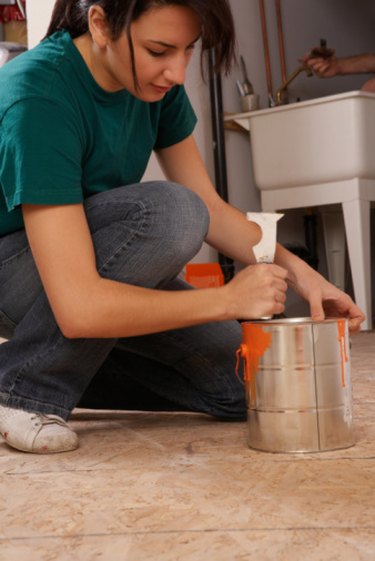Things You'll Need
220-grit sandpaper
Pressure washer
Tack cloths
Professional painter's tape
Canvas drop cloths
Solvent-based paint
Roller frame
Nap roller cover
China paintbrush
Mineral spirits

Powder coating is different from conventional liquid paint, because it needs no solvent to prevent binders and fillers from solidifying. Applied electrostatically, powder coatings form a painted skin much thicker than ordinary liquid paints. Powder coating also tends to dry flawlessly and produces much less hazardous waste than liquid finishes. Unfortunately, powder coatings aren't compatible with water-based paints. If you'd like to paint over powder-coated metal, choose the correct type of finish, or adhesion problems will prove inevitable.
Step 1
Sand the powder-coated metal lightly with 220-grit sandpaper. Don't strip the coating off; the goal here is to slightly roughen the metal coating to make sure the new paint sticks to it.
Video of the Day
Step 2
Wipe down powder-coated metal furniture with tack cloths. Rinse exterior powder-coated metal siding with a pressure washer. Let the metal siding dry for two hours.
Step 3
Coat powder-coated metal siding with a solvent-based paint, using a roller. Roll vertically, stopping every few feet to scan for runs. Smooth any runs with a china brush. If you are painting powder-coated metal furniture, bypass the roller in favor of a china brush. Your own personal brushing method will work fine, as long as you apply a light coat and smooth runs before they have a chance to dry.
Step 4
Let the powder-coated metal dry for two hours. Add a second coat.
Tip
You may also use solvent-based paint to touch-up existing powder-coated finishes.
If you can't work outside, make sure your indoor space is clean and well-ventilated.
Powder-coated surfaces that are well maintained do not need to be primed before painting. However, be sure to prime any rusted areas.
Powder-coated finishes that often need repainting include cars, bikes, metal furniture, wire frame racks and art installations.
Warning
Use mineral spirits to wash tools used to apply solvent-based paints. Never use water, as it will permanently ruin your tools.
Don't apply the second coat of paint too soon after the first, or the finish will dry unevenly.
Video of the Day